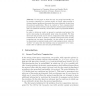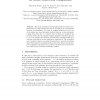150
Voted
CRYPTO
2001
Springer
15 years 5 months ago
2001
Springer
We deal with the problem of a center sending a message to a group of users such that some subset of the users is considered revoked and should not be able to obtain the content of...
106
Voted
CRYPTO
2001
Springer
15 years 5 months ago
2001
Springer
In this paper we show that any two-party functionality can be securely computed in a constant number of rounds, where security is obtained against malicious adversaries that may ar...
116
Voted
CRYPTO
2001
Springer
15 years 5 months ago
2001
Springer
Recently the braid groups were introduced as a new source for cryptography. The group operations are performed efficiently and the features are quite different from those of other...
89
Voted
CRYPTO
2001
Springer
15 years 5 months ago
2001
Springer
The public-key model for interactive proofs has proved to be quite effective in improving protocol efficiency [CGGM00]. We argue, however, that its soundness notion is more subtle...
94
Voted
CRYPTO
2001
Springer
15 years 5 months ago
2001
Springer
We propose the first forward-secure signature scheme for which both signing and verifying are as efficient as for one of the most efficient ordinary signature schemes (Guillou-Qui...
91
Voted
CRYPTO
2001
Springer
15 years 5 months ago
2001
Springer
We present a very efficient multi-party computation protocol unconditionally secure against an active adversary. The security is maximal, i.e., active corruption of up to t < n/...
112
Voted
CRYPTO
2001
Springer
15 years 5 months ago
2001
Springer
Abstract. The shrinking generator is a well-known keystream generator composed of two linear feedback shift registers, LFSR1 and LFSR2, where LFSR1 is clock-controlled according to...
97
Voted
CRYPTO
2001
Springer
15 years 5 months ago
2001
Springer
We present session-key generation protocols in a model where the legitimate parties share only a human-memorizable password. The security guarantee holds with respect to probabilis...
95
Voted
CRYPTO
2001
Springer
15 years 5 months ago
2001
Springer
Recently Victor Shoup noted that there is a gap in the widely-believed security result of OAEP against adaptive chosen-ciphertext attacks. Moreover, he showed that, presumably, OA...
83
Voted
CRYPTO
2001
Springer
15 years 5 months ago
2001
Springer
Abstract. The study of minimal cryptographic primitives needed to implement secure computation among two or more players is a fundamental question in cryptography. The issue of com...


